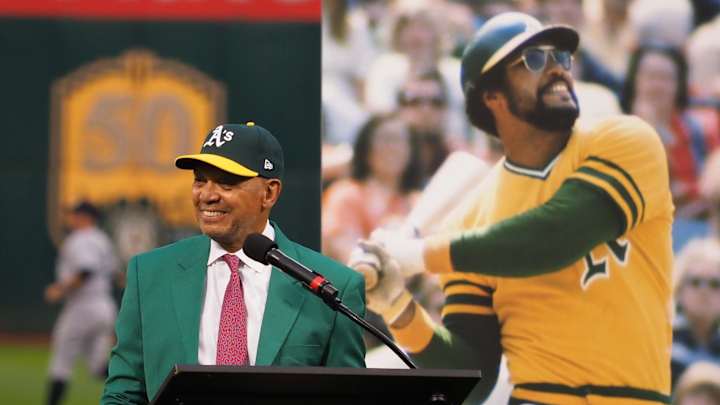Before He Was Mr. October, Athletics' Reggie Jackson Was July’s Surprise

Today was supposed the annual mid-summer celebration of all things baseball, the All-Star Game, which was supposed to be played in Los Angeles in a renovated Dodger Stadium.
COVID-19 changed all that. While a 60-game season is scheduled to start in about 10 days, the All-Star Game has been scratched for the first time in almost nine decades.
In lieu of being able to kick back and watch the best of the best play, we thought we’d take a look at perhaps the biggest moment enjoyed by an Oakland A’s player in the All=-Star Game.
And it has to start with the home run that almost wasn’t, Reggie Jackson hitting one off the light tower in Tiger Stadium in 1971.
Jackson had spent early July preparing to take three days off. And why not? The A’s were 26 games over .500 at 56-30 by the break, 11½ games ahead in the American League West. Jackson himself had a decent enough season. A year and a half removed from is breakout 47-homer season of 1969, he was hitting .269, and had 20 doubles and 17 homers.
The Twins’ Tony Oliva on the other hand, was hitting .374, and if the Twins were five games under .500 and 15 behind the A’s, there was no denying Oliva’s All-Star cred. But a July 4 knee injury sidelined him for two weeks, and Jackson got added to the team by that year’s All-Star manager, Baltimore’s Earl Weaver.
Jackson didn’t start, but his teammate, Vida Blue, did. Johnny Bench rocked Blue for a two-run homer and Hank Aaron put the National League ahead 3-0. That wasn’t that unusual. The American League hadn’t won an All-Star Game since 1961.
Jackson was asked to pinch-hit for Blue in the third. Facing the Pirates’ Dock Ellis, he made it one for the ages. Batting with no one out and Luis Aparicio, who had singled, on first, Jackson launched a bomb that had jaws dropping. He hit the light tower on the roof over the upper deck in right field.
The ball was still rising as it landed an estimated 520-foot feet from the plate, although it was difficult to tell for the television viewer, because the camera couldn't follow the flight of the ball, stopping at the bottom edge of the roof.
The 1971 game was special. Managers still picked the rosters, and this year they outdid themselves. The game included 19 players who went on to the Hall of Fame, and it would have been 20 if Pete Rose hadn’t been, well, Pete Rose.
There were six homers hit in the game. In addition to Bench, Aaron and Jackson, three other Hall of Famers-to-be went deep, Roberto Clemente, Frank Robinson and Harmon Killebrew. This game would be a Classic’s classic. It would turn out to be a 6-4 win, Blue getting the “W.” It was the only AL win from 1962-1983.
Afterward, all anybody wanted to talk about was Jackson’s bomb.
"I was so happy about my home run going so far," Bench told the assembled media. "Then Reggie hit his. I said, 'Oops, mine just went from the sports headlines to the obituary page.’"
There were 31 mph winds buffeting Tiger Stadium that day, so that played into it. But there was a cross section of Hall of Fame sluggers playing, and no one did what Jackson did. No one came close.
“I think it would have gone 600 feet,” Frank Howard said. “You’ll never see five balls hit like that in a lifetime. He crushed it. That ball was really creamed. It would have gone out of any ballpark.”
Jackson, in just his second All-Star Game, still 15 months away from appearing in the World Series and still further away from being Mr. October, almost blushed.
“Do I get an extra charge out of hitting one like this?” he asked rhetorically. “Sure. Nothing thrills me more than to se a fellow like Frank Howard hit one 550 feet. When he says what he did about the one I hit tonight, I can’t think of any finer compliment I’ve ever received.
“I wasn’t even trying to hit a homer. I was just trying to keep from striking out. All I wanted to do was meet the ball.”
He did. And then he met history.
Follow Athletics insider John Hickey on Twitter: @JHickey3
Click the "follow" button in the top right corner to join the conversation on Inside the Athletics on SI. Access and comment on featured stories and start your own conversations and post external links on our community page.
